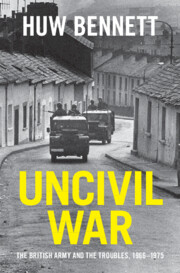Book contents
- Uncivil War
- Cambridge Military Histories
- Uncivil War
- Copyright page
- Dedication
- Contents
- Figures
- Maps
- Tables
- Illustrations
- Abbreviations
- Introduction
- 1 Baggage
- 2 The Army’s Short-Lived Ulster Honeymoon
- 3 Escalation and the Erosion of Impartiality
- 4 Edward Heath’s Bid for Victory
- 5 The Road to Bloody Sunday
- 6 The Most Deadly Year
- 7 Strategy in the Shadow of Loyalist Power
- 8 We Cannot Envisage Peace
- Conclusion
- A Note on Sources
- Acknowledgements
- Notes
- Bibliography
- Index
7 - Strategy in the Shadow of Loyalist Power
Published online by Cambridge University Press: 03 August 2023
- Uncivil War
- Cambridge Military Histories
- Uncivil War
- Copyright page
- Dedication
- Contents
- Figures
- Maps
- Tables
- Illustrations
- Abbreviations
- Introduction
- 1 Baggage
- 2 The Army’s Short-Lived Ulster Honeymoon
- 3 Escalation and the Erosion of Impartiality
- 4 Edward Heath’s Bid for Victory
- 5 The Road to Bloody Sunday
- 6 The Most Deadly Year
- 7 Strategy in the Shadow of Loyalist Power
- 8 We Cannot Envisage Peace
- Conclusion
- A Note on Sources
- Acknowledgements
- Notes
- Bibliography
- Index
Summary
The British strategy from late 1972 aimed to solve the conflict politically by drawing moderate nationalists and unionists into the centre ground, while degrading the Provisional IRA militarily. In May 1974 the strategy unravelled when the Ulster Workers’ Council strike destroyed the power-sharing compromise. This chapter explains how the Northern Ireland conflict became intractable before the strike. The British Army lacked the capacity to overcome the Provisional IRA militarily, and the decision to appease loyalism backfired. The UVF and UDA were emboldened to the point where their violence strengthened republicanism. This chapter shows how tactical adaptation allowed the Provisional IRA to survive. The army lacked enough troops to impose a force concentration powerful enough to crush republican resistance. The army’s operational approach centred around targetting the Provisional leadership, which did limit the Provisionals’ full offensive potential. However, the Provisional IRA replaced lost leaders and reconstituted itself again and again. The chapter also describes the army’s response to the constant flow of criticism about soldiers. Community relations projects convinced soldiers their presence was valued; they under-estimated the hostility directed at them as coming from a vocal minority. An obsession with propaganda made it difficult to discern when complaints were genuine or bogus.
Keywords
- Type
- Chapter
- Information
- Uncivil WarThe British Army and the Troubles, 1966–1975, pp. 204 - 246Publisher: Cambridge University PressPrint publication year: 2023

